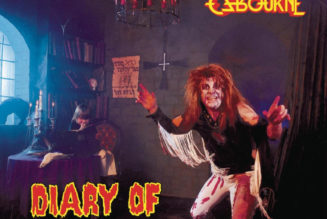
By Max Freedman
We so often think of music as a free-flowing expression of one’s innermost emotions — yearning, love, grief, dismay — that it’s jolting to hear Lucy Dacus speak about it as roughly the opposite. “There are a lot more facts in this,” the Richmond, Virginia-based 26-year-old says of her third album, Home Video, a collection of crystal-clear, folk-inflected rock songs with lyrics that match the music’s lucidity. Not that she’s out here burying statistics in music. Instead, she’s recounting old memories with no filter and turning them into songs, an attempt “to make order out of something… [and] assert control over my perception of myself.” In that regard, Home Video is a smashing success: It puts Dacus’s teenage and early-twenties experiences on the page more clearly than anything she’s done before.
Every song on Home Video, Dacus tells MTV News during a mid-afternoon Zoom chat, “is about someone specific. There’s an actual name and face behind it.” By contrast, on her 2016 debut No Burden and 2018 sophomore LP Historian, she “was making an effort…to write things that were really general.” Those albums earned her a reputation as a leading voice in a new generation of lyrically deft rock musicians — in 2018, the New York Times called her a “star.” The praise dovetailed with an onslaught of touring, first behind Historian and then around her ceaselessly buzzed-about EP with Boygenius, her trio with contemporaries and dear friends Julien Baker and Phoebe Bridgers. The acclaim, success, and travels were great, but the downsides of the latter partially led to the sharpened verse that dominates Home Video.
“Touring a lot and being away from Richmond really shook my identity,” Dacus says, “because I found a lot of myself in my hometown and being involved in the music community there. I felt this urge to reexamine [my] past to get back to some core element of who I am. Occasionally, I’ll get the sense that a past version of myself holds more weight than who I am now.”
Of course, the Boygenius tour wasn’t all bad, and you can hear one of its biggest upsides within the first seconds of Home Video. Warm synths gradually introduce the gleaming, Springsteen-esque opener “Hot & Heavy.” “Being in a band with Phoebe and Julien changed how I write,” Dacus says. “I felt like it gave me more access to myself, and I realized I had all these rules about what I could and couldn’t [do] for no reason.” On No Burden and Historian, she held firmly to those rules, which included a total ban on pianos, synths, and acoustic guitars — which all play a substantial, intentional role on Home Video. They’re a welcome addition: Even if Dacus insists that Home Video “technically [has] some heavier topics than before,” her music has never sounded lighter and freer. This looseness persists whether Dacus’s crystal-clear recollections are enlightening, revitalizing, crushing, or all of the above.
Home Video often sounds like a close friend unburdening herself of a formative teenage or early college memory in full detail. With Dacus’s expanded, freer sonic palette, she needs only droning synths to ground a story: On “Thumbs,” she tells of remaining physically present with someone going through the unthinkably terrifying experience of seeing their emotionally abusive father for the first time in ages (“I would kill him if you let me” is a balm, not a threat). When she mentally revisits an old friend stuck in a relationship that fit neither their emotional needs nor their sexuality, she does so not amid her longtime melancholy, bluesy rock but instead twinkling pianos and acoustic guitars (“Christine”). In both cases — and throughout the album — Dacus paints her experiences in so much detail that you might as well be right next to her. You can practically smell the nutmeg the teenage antihero of “VBS” snorts in his bunk bed (an event Dacus says is, yes, a fact).
It’s close to impossible to describe Home Video without naming things Dacus has actually experienced, and that’s exactly the point. The collection showcases her less as a songwriter than a storyteller with a novelist’s pen, an empath with a photographic memory. Her habit of telling it like it is comes from her upbringing. As she discusses the “hundreds of hours of home videos that my dad took of me when I was younger,” she says that this footage evokes “the power [of] looking at something and documenting it.”
That’s a huge part of why Dacus chose to title the album Home Video. “[My dad] was making sense of his surroundings by framing it and cutting out everything else,” she says, “and that is a creative impulse I’ve shared with him…focusing on one thing can help you understand everything else.” Dacus also says she feels the same about watching these tapes as writing her songs: “I come out of them knowing more than I did before and feeling like I have power over my own thoughts.”
Although Dacus doesn’t record clips herself, she says she’s “carrying on this construction of memory that my dad began. I might be writing a song about a bad relationship…or a friend in high school that I have complex feelings about, but it’s still stuff I want to remember, and stuff that I will remember because I learned from it. It shaped me.” Later, talking about something else entirely, Dacus says something that feels tied to this mindset. “I get a better understanding of my life when I revisit things every couple of years,” she says. “I gain a lot of wisdom from realizing how much I didn’t realize previously.”
Near Home Video’s end, Dacus sounds closer than ever to understanding who she’s previously been, what she’s been through, and how that’s all made her who she is today. On “Brando,” amid high-strung acoustic guitars that sound like flowers suddenly bursting from a long-budding stem, Dacus is entirely aware that she’s far superior to what an old love interest thought of her. “You called me cerebral,” she recalls before asking with a healthy dose of humor, “Would it have killed you to call me pretty instead?” The chorus hinges on the declaration that “you never knew me like you thought you did,” as though Dacus — at least for now — does know herself. And more importantly, she has no time for people who can’t see in herself what she does.
Two tracks later, as Dacus sings “I’m not tired yet / We still got a lot to figure out” at the outset of closer “Triple Dog Dare,” she seems to acknowledge that this whole self-reckoning thing is an endless cycle. No matter how close you come to knowing your true self, you can always get closer — what matters is that you’re using the past to inform the future. “I was looking for something Capital-T True about myself,” Dacus says, “and I don’t have the feeling that I found it. But,” she adds confidently, “I do feel good about the process.”









